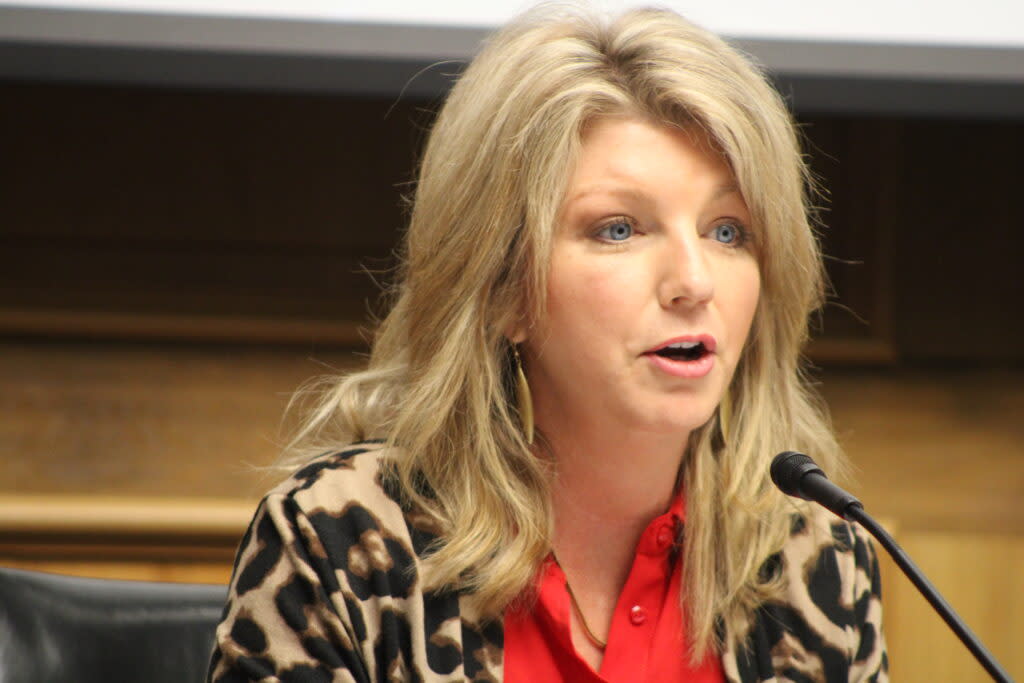Legislature moves to gut public records law, restrict access to most government activity

- Oops!Something went wrong.Please try again later.
- Oops!Something went wrong.Please try again later.
Sen. Heather Cloud, R-Turkey Creek, pictured at the March 21, 2023, Senate Finance Committee meeting. (Greg LaRose/Louisiana Illuminator)
In a move alarming to journalists, First Amendment lawyers, and good-government watchdog groups, the Louisiana Legislature is moving to significantly narrow the state public records law with legislation that could remove the majority of government activity from public view.
Sen. Heather Cloud, R-Turkey Creek, introduced Senate Bill 482, which includes language that “provides as an exception to the public records law for any records reflecting advisory opinions, recommendations and deliberations comprising part of a process by which governmental decisions and policies are formulated.”
Cloud’s argument is that the public is entitled to records of public meetings, and policy decisions and results of governmental deliberations, but not the deliberations themselves, unless they take place at a public meeting. At a Senate committee hearing, she argued: “To put that information out prematurely would be disingenuous, misleading, and potentially catastrophic in some cases. So, final work products, that final press release is fine, that is protected. It’s a final work product and it would be part of the public record. But anything prior to that, that’s a work-in-progress and it shouldn’t go out to the public.”
Gov. Jeff Landry apparently agrees. As the bill took its first step toward becoming law last week, Landry issued a series of statements indicating his strong support.
Landry’s justification for changing the law is his assertion that public records request laws have been “weaponized to stifle deliberative speech.” Landry also complained that during his time as state attorney general, he needed to hire additional lawyers to respond to public records requests, many of which he believed were “frivolous.”
A long line of citizen watchdog groups and lawyers representing news media organizations showed up to a Senate committee hearing to oppose the bill. Many pointed out that since the language in the law is so broad, it could be used to block access to the majority of existing public records of government proceedings, at the discretion of the agency in question.
The only way the public can access this closed-door activity is through public record requests. Only a small percentage of activity takes place in public meetings. Scott Sternberg, attorney for the Louisiana Press Association, was very direct in his assessment. During his testimony, he said “This exemption is a repeal of the public records law.”
GET THE MORNING HEADLINES DELIVERED TO YOUR INBOX
Several scholars and citizen watchdog groups spoke with Fox 8 News last week expressing concern about SB 482. David Cuillier, co-director of the Brechner Center for the Advancement of the First Amendment at the University of Florida, pointed out that Louisiana already has a low rank in terms of transparency, this bill would move the state to last.
“Already Louisiana ranks very low in its compliance with the law and transparency, it’s about 43rd in the country by our research.”
University of New Orleans Forensic Science Professor Skip Gallagher, who has worked with Fox 8 on police corruption investigations that later led to federal indictments, pointed out that it’s already difficult to get internal police documents. Gallagher said, “Even with the laws in place now, if someone denies you a public record, you need to sue. You really need to pony up some money.”
Terry King, with the group Concerned Citizens of St. Tammany Parish, noted that it was only because of public records requests that his group was able to discover corruption on the part of St. Tammany Parish Coroner Peter Galvan, leading to his conviction and removal.
Both King and Gallagher agreed the bill, as it is written, is unconstitutional and would later be overturned, if passed. But they said the legal fees alone would be a waste of taxpayer money. “It’s just going to cause an undue burden on citizens groups and media personnel to file a lawsuit and get it thrown out on constitutionality grounds,” King said.
The ability of the public to hold elected officials accountable would suffer if this bill were to pass. This bill would greatly restrict investigations of public corruption, conducted by investigative journalists and citizen watchdog groups. Acts such as bribery, kickbacks, and influence-peddling are never revealed in a public meeting. When journalists and others have discovered this activity in the past, it has usually been the result of reviewing scores of internal documents recording private deliberations, finding suspicious information in those documents, and digging further, following the evidence where it leads. This bill would remove those documents from public view. They would not be subject to public records requests.
It is important to note that this bill would not only exempt the governor and Legislature. It would exempt every public body in the state. This includes the Sewerage & Water Board, Regional Transit Agency, New Orleans Police Department, and Louisiana State Police. Internal records of police violating citizen rights could be concealed, as well as records of wasteful spending of taxpayer money.
In spite of the large number of committee witnesses opposing the bill, it was passed out of its Senate committee by a straight party line vote of six Republicans voting yes and two Democrats voting no. It is expected to meet with more opposition in the full Senate — where it is scheduled for floor debate this week — as members of the public learn that SB 482 has the possibility of concealing corruption and waste, and begin contacting their senators to oppose it.
This article first appeared on Verite News and is republished here under a Creative Commons license.

The post Legislature moves to gut public records law, restrict access to most government activity appeared first on Louisiana Illuminator.

